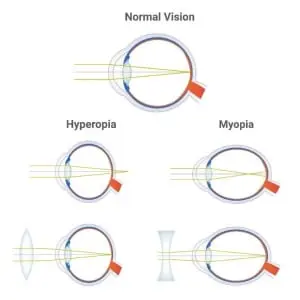What Is Myopia?

The Eye Health Centre was established with the common goal of providing exceptional eye care services to every patient, including those diagnosed with myopia (short-sightedness or nearsightedness). We believe each patient has a unique set of medical and personal needs that must be considered when treating their condition. There is no “one-size-fits-all” solution that works for everyone.
If you have been diagnosed with myopia, we will make the effort to get to know you and understand your lifestyle in order to provide the solution best suited to your goals.

Symptoms of Myopia
Myopia makes it harder to see objects at a distance. Faraway objects appear blurry while nearby objects can be seen clearly. To put it in a driving context, if you have myopia, you can see your steering wheel and dashboard clearly, but the road and road signs appear blurry.
The worse the myopia, the blurrier distant objects may appear. Other symptoms of myopia include recurring eyestrain, headaches or eye fatigue when performing certain activities such as driving or playing outdoor sports. Constantly squinting to focus on objects at a distance can also suggest myopia.
Myopia In Children
Myopia often develops in children between the ages of 8 and 12. A genetic factor is suspected, as children of adults with myopia are more likely to develop the refractive error. If undetected and untreated, myopia can interfere with a child’s learning and academic performance, so it is important to be on the lookout for signs of myopia. These include squinting to see distant objects and complaints of sore eyes or headaches. Poor reading posture or holding reading material very close to the face can also suggest myopia in children.
Diagnosing Myopia
Myopia is easily diagnosed by our eye care professionals through a comprehensive eye exam and vision test. We use state-of-the-art technology to confirm myopia and determine the root cause.
Solutions for Myopia
In many cases, myopia can be easily treated with prescription eyeglasses or contact lenses that compensate for the eye’s inability to focus properly. Glasses or contacts change the way incoming light is bent or refracted so it comes into focus directly on the retina.
Permanent lenses
Laser Eye Surgery
Another treatment option is refractive surgery, which reshapes the cornea to improve how it refracts light. Surgical procedures such as photorefractive keratectomy (PRK) or laser-assisted in situ keratomileusis (LASIK) are popular solutions for those who find dependence on glasses or contacts to be a burden.
Contact Our Eye Health Professionals
The Eye Health Centre has been helping individuals with myopia for many years. We use our clinical experience coupled with leading-edge technology to provide vision correction solutions unique to every patient.
For more information about myopia and the available treatment options, please request a consultation at The Eye Health Centre today. We look forward to serving you at one of our four convenient office locations.



